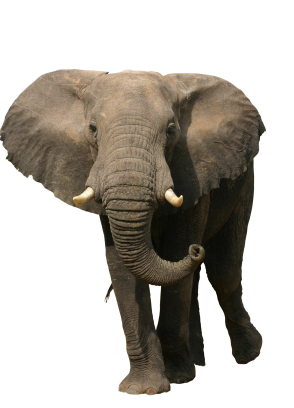Is this the darkest era of our society, or a time of unlimited possibility? Is the US economy dying or merely "right-sizing"?
More than just simply labeling these viewpoints as "optimistic" or "pessimistic", it's important to notice that how we choose to look at situations changes our outcomes.
I'm reminded of the fable of the blind men and the elephant. A story originally from India, the core of the tale is of a group of blind men encountering an elephant for the first time.
Each blind man touches a different part, but only one part, such as the side or the tusk. They then compare notes on what they felt — "an elephant is a wall!" "no, no, an elephant is like a sharp spear!" – and learn they are in complete disagreement as to what an elephant is.
"Reality" and "truth" vary depending upon our perspective, meaning that what can seem like an absolute truth is actually quite subjective based on what data we choose to use to gather and create our hypothesis. Our beliefs in turn drive our actions.
Whether you are faced with diminishing resources within your organization, a lay-off, or a serious illness, is a door opening or closing? How you choose to look at and respond to the situation — as an opportunity to reorganize, reinvent, or reprioritize — is up to you.
As Emerson says, "This time, like all times, is a very good one, if we but know what to do with it."
What perspective(s) will you choose today?
How does your perspective influence the actions you take?


 Before specializing as a professional coach in 2004, I spent more than a decade in leadership, management and program development for state and local government and non-profit organizations. Now I get to help leaders and teams have more clarity and ability to stand up for what's important in their work and in their organizations. Working with me, leaders and teams find more meaning and purpose, feel happier and more confident, navigate change and conflict, and work together better.
Before specializing as a professional coach in 2004, I spent more than a decade in leadership, management and program development for state and local government and non-profit organizations. Now I get to help leaders and teams have more clarity and ability to stand up for what's important in their work and in their organizations. Working with me, leaders and teams find more meaning and purpose, feel happier and more confident, navigate change and conflict, and work together better.
I love the “elephant story” because it is so right on! I am a priest and when I do pre-marriage counseling, one of the things I emphasize is that each one of them is coming from somewhere different. I use “Men are from Mars, Women are from Venus” to impress on them how important it is that they accept that the other person is different – each comes from different parents, different upbringing, different experiences, etc. and so we are each who we are. If two people are going to be able to live together and love each other for the long term, they have to let the other person be who and what they are and understand that who and what they are and so what they do and say is not because “he doesn’t love me” or “she really doesn’t care what I want” – it’s because he is being himself or she is who she is. Differences are so important that it is vital that we recognize them, understand them, and celebrate them instead of letting them convince us that the elephant in the room is really a big marshmallow!
Susan,
Joy is indeed in the difference!
Thanks for your thoughts!
Hanna